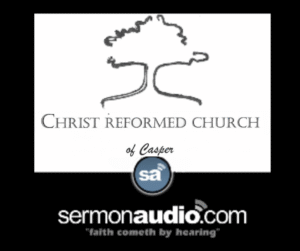We in the Reformed Church believe that one of the key ways that God converts people to the truth of Jesus Christ is through the preaching of the word. That can happen in different environments, both public and private. In James 1:18 we read, “Of His own will He brought us forth by the word of truth, that we might be a kind of firstfruits of His creatures.” (Jam 1:18 NKJ) Every sermon that is preached ought to be preached with a mind toward those who do not believe. There ought to be in any sermon a call to repent of sin and trust in the Lord. That does not mean that every sermon must be preached on the same subject of justification by faith alone, specifically. We recognize that the gospel of Jesus Christ is much bigger than the doctrine of justification by faith alone and touches on every area of our lives, and therefore a sermon about proper attitudes toward money or about a Biblical approach to raising children (for example), rightly understood, will in part be a call to repent of our idolatry and worldly attitudes, and to submit to the lordship of Jesus Christ, in whom we have forgiveness of sins and the power of the Spirit in whose strength only we have any hope of success. Likewise, we can preach the whole counsel of God from every part of Scripture and see it all through the lens of Jesus Christ, the perfect Servant of God, who delivered us from bondage and who is the way of life.
In 1 Corinthians 14:23, Paul warns the Corinthian church against behaving in such a way in their worship service that one who is uninformed will think they are insane. Our worship services should then be basically understandable, even to one who knows little or nothing about Christianity. Obviously this should be understood in a relative sense, for if our worship services are to be rich in worship and praise to God, and edifying to those who are already in the church, there will doubtless be things that go over the head of one who is uninformed. But the goal must be, as Paul goes on to say in 1 Corinthians 14, not simply the spiritual good feelings of those already inside the church, but that those who do not believe will hear there an intelligible call to repent and believe in the gospel.
The question that is sometimes raised about how much of the service should be for the believer and how much for the unbeliever is a bit of a false dilemma, since the believer and the unbeliever need essentially the same thing. Both need to repent of their sin and submit themselves to the Lord, putting their trust in Him for salvation. The same message that converts the unbeliever to faith in Christ is the same message that the believer needs to hear every day. We have a continual need to be reminded of the merits of Christ’s death and the complete confidence we can have in Him. We all need to be reminded of the utter hopelessness of our condition apart from Christ. We all need to see the lies of the world for what they are and the life and truth that are found in God’s truth. We all need to see Christ as the source of our life and hope, and as the perfect example of what we are all called to be, the faithful servant of the Father. We all, in short, need to hear the Gospel of the Kingdom of God, and we need to hear it in a way that is clear, direct and understandable, whether one is an outsider, a child in the faith or a mature and seasoned believer.
Inviting people to church is therefore an effective and suitable means of evangelizing your friends and neighbors. We also hope you will encourage your pastor to preach and teach in a way that is accessible to those not well versed in academic theological terminology (in a loving way, of course!) so that all can have confidence in inviting those outside the faith to come and hear the message of salvation.

